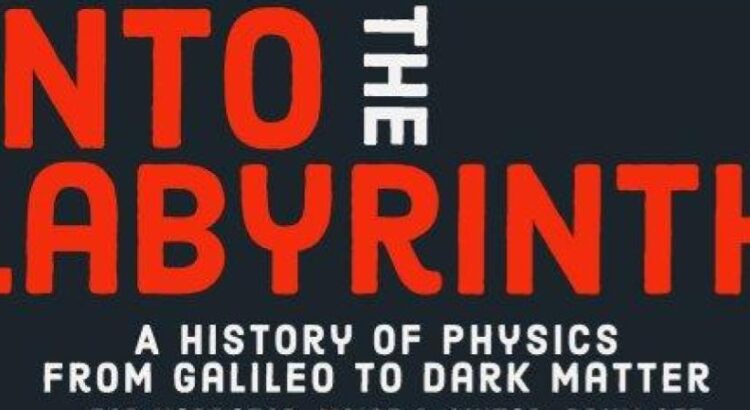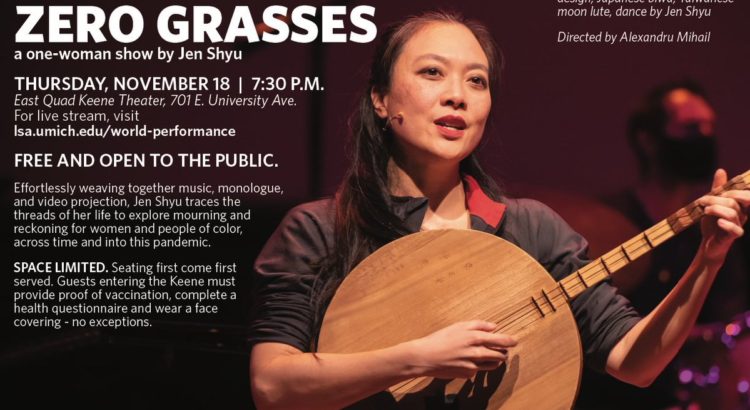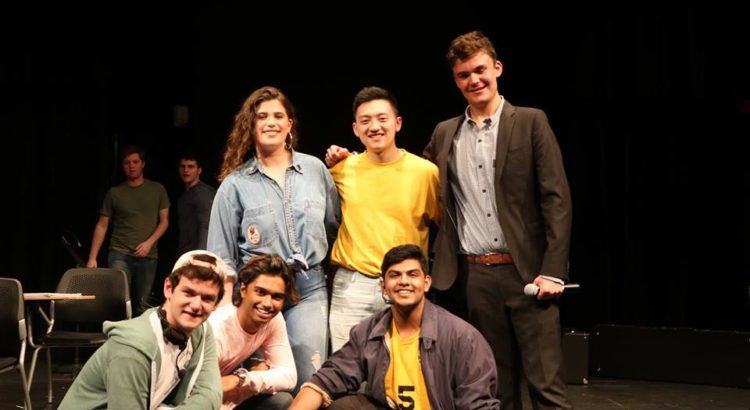I confess that I don’t quite know how to review Jen Shyu’s Zero Grasses performance piece. I’m a beginner to performance art. I don’t see it very often, and when I do most of it goes over my head. It’s true that I didn’t understand all of this performance, but what I can say is that I am so, so glad I went to it regardless because it connected with parts of my identity that I didn’t expect it to.
This artist residency was made possible by the Center for World Performance Studies (CWPS) at UM! They connect with students, artists, and scholars all across the globe to advocate for the power of performance for research and for public engagement. They work with lots of great artists, and center on underrepresented, non-Western, and diasporic voices, bodies, and acts. Check out their
website to learn more, their next event is coming up on
December 8.
 Jen Shyu is a vocalist, composer, multi-instrumentalist, and dancer. She graduated from Stanford in opera and has
Jen Shyu is a vocalist, composer, multi-instrumentalist, and dancer. She graduated from Stanford in opera and has
classical violin and ballet training and has studied traditional music and dance from numerous cultures around the world. I went into Jen Shyu’s performance knowing none of this and came out thinking one thing: She is fully, imperfectly, human.
In Zero Grasses, Jen Shyu explores parts of her past that are, as she described in the post-performance Q&A, “icky.” She reenacted the moment she found out about her father’s passing while working abroad. The news came from an email message, cold and stark and impersonal, screenshotted and projected onto the stage. She danced and sang through the story of a relationship she had with a man twice her age. She read a diary entry from her childhood about the time she was called a racial slur as she stepped off the bus. She lay on the floor in grief when, after a lengthy and expensive medical procedure, the doctor only extracted one viable egg.
The performance was not neatly separated. She skips back and forth between chapters of her life, showing how messy they are, showing how a page written in a diary journal when she was 8 has parallels with her job as a salsa dancer at age 23. The creativity of it all blew me away. Numerous different instruments (most of which I can’t remember the names of) were strategically placed around the stage. Jen would fluidly move between them, coaxing music out of each to back up her rich singing like it was as easy as breathing. The main props used were giant cardboard boxes, each with artifacts from her past. At times she would paw through the boxes, fling them across the stage, or stack them on top of each other as a makeshift wall to project media onto.
 The projections of pictures and videos that she had taken on her phone made it so REAL. I was looking at history but I was also looking at something that was continuously being created, a picture that could have been taken yesterday. I think it was the perfect way to capture Jen’s journey with grief, how she felt it anew each day. It was very alive.
The projections of pictures and videos that she had taken on her phone made it so REAL. I was looking at history but I was also looking at something that was continuously being created, a picture that could have been taken yesterday. I think it was the perfect way to capture Jen’s journey with grief, how she felt it anew each day. It was very alive.
In the Q&A, I asked how she was able to explore these vulnerable parts of her past and portray herself in a light that isn’t so great while still protecting her mental health. She responded that she is always thinking about who she could be helping with her art. She feels she would be doing more harm if she DIDN’T talk about these uncomfortable topics because they’re already taboo and it’s hard for people to find a safe space to process them. She does this in an attempt to have that connection with somebody in the audience who thinks “You’re not alone, I was there too at one point in my life.”
I really admire that courage.







